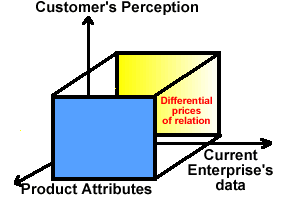Course categories
Skip available courses
Available courses

Analysis & Design Modern Info Sys
This course prepares the students to analyze business information systems in the digital age and to build models and logical designs that can be later implemented. Emphasis in the beginning of this course is on understanding the business processes and business requirements and building conceptual models that help in analysis of business requirements. The second part of this course prepares the students to design complex systems and to build designs and architectures that can be later implemented. The course emphasizes business process modeling, business patterns, object orientation, design patterns and component-based design approaches. Topics include modern system life cycles, project management, BRODE (buy, rent, outsource, develop, extend) strategies in system building, business system modeling, requirements analysis, conceptual design, architectures, physical design, and design for the modern mobile systems with security and integration considerations. Several real life case studies will be discussed.
Fundamentals of Enterprise Risk Management
Risk management is a strategic means to manage organizations and to lead them to achieve goals. Dealing with uncertainty is part of the rules of competition. Better risk management is to have better capabilities and capacity to build in the organizations sustainable and adaptive competitive advantages. This course is oriented to undertand from stategic risk the chain of risks that an holistic view of risk has to analayze.

Development of business operations
Improvement of business operations and managing supply chain is fundamental in the correct development of the organizations. This course review the methods and techniques to help organizations to enhance operations management.

Technology for SMEs data analytics
Nowadays, technology is possible to use in the development of capabilities to compete and to improve productivity, efficiency and support decision making processes. The cost of the technology is not a barrier to achieve the goal of good of data analytics use, the barrier is in the creation of mindsets in the organization management to adopt that technology and use it appropriately. This course and the program is for creating the mindset and to use wonderful tools that will help the organization to advance and adapt strategies to win.

Strategic Intelligence in Organizations
Strategic Intelligence is the fusion of Business Intelligence, Competitive Intelligence and Artificial Intelligence. It is the way to generate value for stakeholders from internal and external knowledge to compete and to achieve organizations' goals. This course introduces to the principles and ways to improve satrategic intellince in organizations from data to actions.

Principles and Practice in Data Analytics and AI
Preparation for adopting in appropriate way new technologies, dealing with risk of new technologies and potentializing the use of new knowledge is fundamental to move ahead in the creation of adaptive sustainable competitive advantages and generation of corporate's intelligence for the benefit of organization's stakeholders.

Understanding Enterprise Risk Management
Enterprise Risk Management view at top management is crucial to have as a means not only for management control systems design but also to design strategies for obtaining more benefits of new technologies, data analytics, AI and digitalization.

AI and Data Analytics in Intelligence Development
Digital and data driven enterprises rely on knowledge that needs to be managed and processed through a variety of intelligent tools. This course will cover the analytics knowledge management system design in modern enterprises and discuss how AI means are supporting organizations. Topics will include: principles of business analytics, data mining, data warehousing, text mining, knowledge management, from decision support and expert systems to LLM in artificial intelligence, neural networks, learning systems, and intelligent agents in a business context. Examples and case studies will be used to illustrate the key applications in a digital and AI oriented economy.

Principles and Applications of Machine Learning
AI is a universe that is in the opening stage for understanding, in this course there is an introduction to understand basic tools in R and Python to create solutions and applications of AI.

Statistical and Machine Learning
Understanding of the basic models for prediction, classification, creation of groups, link analysis, and multiple other problems require the understanding of the pillars of statistical and machine learning models.

Data Visualization
Data visualization goes beyond creation of charts because data visualization is about exploration, description, models understanding and evaluation, workflows of data analytics process, creation of data products and use of capabilities of languages and tools.

Optimization
Optimization is part of prescriptive analytics and at the same time a way to understand how algorithms are improving the search for answers and convergence.

Decisions and Data Analytics
Using data analytics for supporting the decision making process requires not only the modeling process but also the creation of understanding and guides for actions.

Marketing and Strategy Analytics
The potential of the use of data analytics is enormous, many questions and problems from marketing research to strategy can be solved.

Principles of Analytics I and II
These courses are the basis for understanding from EDA to basic models of statistical and machine learning

Innovation Risk
Changes in organizations because of innovation are bringing new risks that require understanding and strategies of mitigation.

Introduction to Actuarial Mathematics 1 and 2
Actuarial mathematics for analysis of risk in individual and collective cases, development of pricing methods and understanding of modeling frequency and severity of risk events.

Return Analytics
This course is going beyond the traditional interest theory to the analysis of returns in multiple types of portfolios and processes.

Strategic Risk Analysis
Strategic risk is the study of factors affecting the competitive positions of organizations.

Enterprise Risk Management
This is the course for developing a holistic view of risk in the organization

Risk Monitoring
This is the course to study the analysis and design principles for a risk management system.

Data Analytics In insurance
The opportunities to use data analytics techniques in the insurance industry are infinite. This course is prepared to guide professionals to use in a better way data in insurance industry.

Principles of Insurtech
Insurtech is a trend in insurance companies to use technology as support and control of risk processes in insurance organizations

Actuarial Mathematics Introduction
This is the course to introduce students in the modeling process for dealing with uncertainty and risk in insurance related processes

Principles of biostatistics
Using data is a purpose in nowadays organizations and that is possible if problems to solve are with robust statistics concepts.

Operation Management in Healthcare
Operations management in healthcare using technology and development of services for internal and external users.

Principles of Data Analytics in Healthcare
Health organizations are very complex organizations where coexist the scientific worlds, administration and services to the community. Data analytics is a powerful approach to solve multiple problems in healthcare administration.

Technology and Innovation in Banking
Technology is taking space closer and closer of the daily operation in banking. Members of the staff of banks need to point creativity to manage for the organization's benefit the approaches coming from blockchain, use of cloud services, development of AI support means to lead decisions in strategy, and managing the banking portfolios in investment, promotion, markets, products etc.

Risk Analytics in Banking
Risk analytics is an area in development to improve the capabilities in organizations to generate solutions for new product development, control of exposure and control of losses.

Principles of Data Analytics in Banking
This course brings you to the world of using data analytics for operations, risk management, pricing, marketing and strategy in banking organizations. The most important aspect in this program and courses is the integration of perspectives in banking business using techniques and tools of data analytics.
Skip courses
Courses
Fundamentals of Enterprise Risk Management
Risk management is a strategic means to manage organizations and to lead them to achieve goals. Dealing with uncertainty is part of the rules of competition. Better risk management is to have better capabilities and capacity to build in the organizations sustainable and adaptive competitive advantages. This course is oriented to undertand from stategic risk the chain of risks that an holistic view of risk has to analayze.

Development of business operations
Improvement of business operations and managing supply chain is fundamental in the correct development of the organizations. This course review the methods and techniques to help organizations to enhance operations management.

Technology for SMEs data analytics
Nowadays, technology is possible to use in the development of capabilities to compete and to improve productivity, efficiency and support decision making processes. The cost of the technology is not a barrier to achieve the goal of good of data analytics use, the barrier is in the creation of mindsets in the organization management to adopt that technology and use it appropriately. This course and the program is for creating the mindset and to use wonderful tools that will help the organization to advance and adapt strategies to win.

Strategic Intelligence in Organizations
Strategic Intelligence is the fusion of Business Intelligence, Competitive Intelligence and Artificial Intelligence. It is the way to generate value for stakeholders from internal and external knowledge to compete and to achieve organizations' goals. This course introduces to the principles and ways to improve satrategic intellince in organizations from data to actions.

Principles and Practice in Data Analytics and AI
Preparation for adopting in appropriate way new technologies, dealing with risk of new technologies and potentializing the use of new knowledge is fundamental to move ahead in the creation of adaptive sustainable competitive advantages and generation of corporate's intelligence for the benefit of organization's stakeholders.

Understanding Enterprise Risk Management
Enterprise Risk Management view at top management is crucial to have as a means not only for management control systems design but also to design strategies for obtaining more benefits of new technologies, data analytics, AI and digitalization.

AI and Data Analytics in Intelligence Development
Digital and data driven enterprises rely on knowledge that needs to be managed and processed through a variety of intelligent tools. This course will cover the analytics knowledge management system design in modern enterprises and discuss how AI means are supporting organizations. Topics will include: principles of business analytics, data mining, data warehousing, text mining, knowledge management, from decision support and expert systems to LLM in artificial intelligence, neural networks, learning systems, and intelligent agents in a business context. Examples and case studies will be used to illustrate the key applications in a digital and AI oriented economy.

Principles and Applications of Machine Learning
AI is a universe that is in the opening stage for understanding, in this course there is an introduction to understand basic tools in R and Python to create solutions and applications of AI.

Statistical and Machine Learning
Understanding of the basic models for prediction, classification, creation of groups, link analysis, and multiple other problems require the understanding of the pillars of statistical and machine learning models.

Data Visualization
Data visualization goes beyond creation of charts because data visualization is about exploration, description, models understanding and evaluation, workflows of data analytics process, creation of data products and use of capabilities of languages and tools.

Optimization
Optimization is part of prescriptive analytics and at the same time a way to understand how algorithms are improving the search for answers and convergence.

Decisions and Data Analytics
Using data analytics for supporting the decision making process requires not only the modeling process but also the creation of understanding and guides for actions.

Marketing and Strategy Analytics
The potential of the use of data analytics is enormous, many questions and problems from marketing research to strategy can be solved.

Principles of Analytics I and II
These courses are the basis for understanding from EDA to basic models of statistical and machine learning

Innovation Risk
Changes in organizations because of innovation are bringing new risks that require understanding and strategies of mitigation.

Introduction to Actuarial Mathematics 1 and 2
Actuarial mathematics for analysis of risk in individual and collective cases, development of pricing methods and understanding of modeling frequency and severity of risk events.

Return Analytics
This course is going beyond the traditional interest theory to the analysis of returns in multiple types of portfolios and processes.

Strategic Risk Analysis
Strategic risk is the study of factors affecting the competitive positions of organizations.

Enterprise Risk Management
This is the course for developing a holistic view of risk in the organization

Risk Monitoring
This is the course to study the analysis and design principles for a risk management system.

Data Analytics In insurance
The opportunities to use data analytics techniques in the insurance industry are infinite. This course is prepared to guide professionals to use in a better way data in insurance industry.

Principles of Insurtech
Insurtech is a trend in insurance companies to use technology as support and control of risk processes in insurance organizations

Actuarial Mathematics Introduction
This is the course to introduce students in the modeling process for dealing with uncertainty and risk in insurance related processes

Principles of biostatistics
Using data is a purpose in nowadays organizations and that is possible if problems to solve are with robust statistics concepts.

Operation Management in Healthcare
Operations management in healthcare using technology and development of services for internal and external users.

Principles of Data Analytics in Healthcare
Health organizations are very complex organizations where coexist the scientific worlds, administration and services to the community. Data analytics is a powerful approach to solve multiple problems in healthcare administration.

Technology and Innovation in Banking
Technology is taking space closer and closer of the daily operation in banking. Members of the staff of banks need to point creativity to manage for the organization's benefit the approaches coming from blockchain, use of cloud services, development of AI support means to lead decisions in strategy, and managing the banking portfolios in investment, promotion, markets, products etc.

Risk Analytics in Banking
Risk analytics is an area in development to improve the capabilities in organizations to generate solutions for new product development, control of exposure and control of losses.

Principles of Data Analytics in Banking
This course brings you to the world of using data analytics for operations, risk management, pricing, marketing and strategy in banking organizations. The most important aspect in this program and courses is the integration of perspectives in banking business using techniques and tools of data analytics.
Skip site announcements